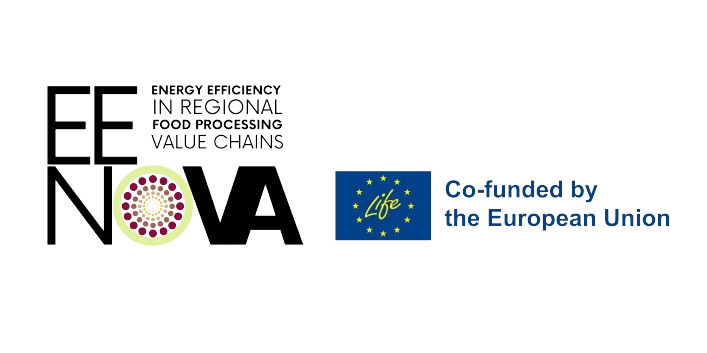Related Policy Material
EU Policy Layer
EENOVA supports various complex multidimensional policies of the European Green Deal. EENOVA will promote several policies by either tackling it directly in the in the project itself or supporting it indirectly through the overall action of the project (e.g., energy efficiency and renewable energy are one needed path of many for climate neutrality). Within the goal of the twin transition to a green and digital economy, EENOVA focuses on the green transition within Agri-Food industrial ecosystem.

Climate action and the path to climate neutrality 2050
Due to the need of a strategic autonomy and resilience in the Agri-Food Ecosystem, the Agri-Food Ecosystem is one of 14 industrial ecosystems that is tracked via annual single market report. EENOVA focuses on a middle step-the food processing-of the whole Agri-Food ecosystem while not neglecting the predecessor steps of the crop and animal production, fishery and aquaculture or the successor steps in trading or retailing or accommodation and related food services.

European Industrial Strategy
Due to the need of a strategic autonomy and resilience in the Agri-Food Ecosystem, the Agri-Food Ecosystem is one of 14 industrial ecosystems that is tracked via annual single market report. EENOVA focuses on a middle step-the food processing-of the whole Agri-Food ecosystem while not neglecting the predecessor steps of the crop and animal production, fishery and aquaculture or the successor steps in trading or retailing or accommodation and related food services.

Farm to Fork Strategy
The aim of the Farm to Fork Strategy is to make the food systems fair, healthy, and environmentally friendly. Besides the topics of sustainable food production, sustainable food consumption, food loss & waste prevention the strategy also puts its emphasis on sustainable Food processing and distribution. At the core of EENOVA is reducing the environmental footprint and energy consumption of food companies by becoming more energy efficient and using renewable energy.EENOVA supports the process of the food industry to integrate sustainability into corporate strategies.

EU Bioeconomy Strategy
The development of the bioeconomy entails the more efficient use of all types of resources. The Bioeconomy strategy emphasise the need to improve resource-efficiency in the “food supply chain’’ and “food making value chain”. In this regard, the strategy agrees on the need to reduce water consumption and energy use, as well as minimise raw material losses and waste production, and to maximise recycling from food processing, through to transport and distribution. This is expected to result from increased resource-efficiency along the food chain by efficiency improvements of existing processes and the adoption of new technologies (water-and energy-saving technologies in particular) and processing methods.

RePowerEU
The development of the bioeconomy entails the more efficient use of all types of resources. The Bioeconomy strategy emphasise the need to improve resource-efficiency in the “food supply chain’’ and “food making value chain”. In this regard, the strategy agrees on the need to reduce water consumption and energy use, as well as minimise raw material losses and waste production, and to maximise recycling from food processing, through to transport and distribution. This is expected to result from increased resource-efficiency along the food chain by efficiency improvements of existing processes and the adoption of new technologies (water-and energy-saving technologies in particular) and processing methods.

Food Security and Resilience of Food Systems
Although the food supply as such is not at stake in the EU today due to high levels of self-sufficiency the recent developments in Ukraine and its inflicted consequences have exposed the EU (and the global) food system to vulnerable points. The dependence of imports of energy, fertiliser and animal feedraised concerns on EU (and global) food security. The aim of EENOVA is to find concrete solutions(e.g.,energy efficiency, production and use of renewable energy, heat pumps, …)within the food processing value chains.

Just Transition
The development of the bioeconomy entails the more efficient use of all types of resources. The Bioeconomy strategy emphasise the need to improve resource-efficiency in the “food supply chain’’ and “food making value chain”. In this regard, the strategy agrees on the need to reduce water consumption and energy use, as well as minimise raw material losses and waste production, and to maximise recycling from food processing, through to transport and distribution. This is expected to result from increased resource-efficiency along the food chain by efficiency improvements of existing processes and the adoption of new technologies (water-and energy-saving technologies in particular) and processing methods.


